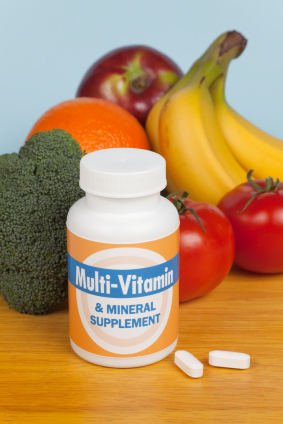CoQ10: For a Healthy Heart
CoQ10: For a Healthy Heart
By: Dr. George Obikoya
Most people associate CoQ10 with a healthy heart. However, CoQ10 plays a critical role in the body that extends far beyond just the heart. CoQ10 is an enzyme found in all cells of the body. It occurs naturally, and is the co-factor in the electron transport chain between cells. CoQ10 is located in the mitochondria, tiny power plants found in every cell in the body, and effectively supports the energy producing pathways to help fuel the body's daily activity.
If you lack CoQ10, your body's most important source of cellular energy is depleted, and many medical conditions are aggravated and made worse. It is most concentrated in the heart and liver, and is a vital component in the mitochondria, the body's metabolic factories.
CoQ10 is a powerful antioxidant, scavenging free radicals, sitting in the membranes with Vitamin E which it recycles to keep it most active. Studies have shown CoQ10 to be effective in combating a number of threats to your cardiovascular health. CoQ10 helps prevent heart disease, boosts cellular energy production thereby improving heart function, and prevents the formation of free radicals to help protect your body's cells. A good liquid multivitamin will contain CoQ10 to help keep your heart healthy.
CoQ10 has been used for years to fight heart disease and to treat the early stages of congestive heart failure in Europe and Japan, coenzyme Q10 is finally gaining mainstream acceptance here in the United States.
As we get older, our body's supply of CoQ10 slowly diminishes. Coenzyme Q10 protects us against dopamine depletion in the brain, providing a specific anti-aging effect by preserving neural functioning. It also protects against periodontal disease and slows aging. It is, therefore, important for you take CoQ10 supplements as you age, preferably in the form of a liquid multivitamin.
CoQ10 extracts energy from the raw materials sent into the mitochondrion of our cells. It also works as an antioxidant. Although most of the oxygen used by the electron transport chain ends up as part of neutral water molecules, sometimes oxygen molecules lose an electron and become "charged." In large quantities, these charged oxygen molecules, known as oxygen free radicals, can be very destructive to the membranes of the cell. CoQ10 helps protect against this damage.
The cellular damage that occurs in many mitochondrial abnormalities and some neurodegenerative diseases, such as ALS, is thought to be linked to or worsened by excess free radical production, known as "oxidative stress." Research has shown that CoQ10 is able to participate in a "cellular buffering system" designed to protect against oxidative stress. CoQ10 acts as an "antioxidant" in the cell because it can neutralize the charged oxygen molecules without becoming destabilized itself, thus stopping the destructive chain reaction. CoQ10 might also juggle electrons back and forth with vitamin E to help neutralize excess charges.
CoQ10 is a safe and effective treatment for a broad range of cardiovascular diseases, including hypertension (high blood pressure), CHF (congestive heart failure) and angina. CoQ10 is a powerful antioxidant and free radical scavenger and all metabolically active tissues are very sensitive to a deficiency in this substance.
A number of clinical trials have been done for conditions such as hypertension, diabetes, and cardiac failure. Some have had positive results, and indeed have seemed to offer great promise. For example, a study of 144 patients with acute myocardial infarction (heart attack) that was published in 1998 demonstrated a halving of total cardiac events (problems) in those given CoQ10 compared with placebo. 1
The effect from 30 mg of CoQ10 is mild, mostly consisting of a slightly higher energy level. The effects become more noticeable with 60 mg and on twice this dose you will notice an obvious increase in energy as the day goes on, with an urge to take a long walk or be physically active. There is a slight mood elevation with enhanced focus, motivation, and productivity, along with the desire to talk to people.
There have been a small amount of skepticisms about the ability of CoQ10 to help with heart disease. A recent research study found that n-3 fatty acids plus CoQ can decrease TNF-alpha and IL-6 in AMI which are pro-inflammatory agents and that it can enhance brain acetylecholine levels, offering protection to the brain. The authors concluded that any agent that can enhance brain acetylecholine levels may be used as a therapeutic agent in protecting the suprachiasmatic nucleus, higher nervous centres, vagal activity and sympathetic nerve activity which are known to regulate the body clock and HRV and the risk of heart diseases and heart attack.2
Another recent study concluded that Coenzyme Q10 supplementation improves endothelial function of conduit arteries of the peripheral circulation in patients with Type II diabetes. The mechanism could involve increased endothelial release and/or activity of nitric oxide due to improvement in vascular oxidative stress. 3
These studies clearly show that there is no doubt that CoQ10 helps with protecting against diseases of the heart and blood vessels.
CoQ10 has no known side effects and can be readily bought over the counter. Thus, many physicians are not even aware of its many benefits. If you take this for your heart and mind, you may be smarter than your less informed doctor.
A good multivitamin is the foundation of health and nutrition. Take a look at our scientific reviews of many of the popular brands for factors such as ingredients, areas of improvement, quality level, and overall value. If you are looking for a high quality liquid multivitamin, we suggest that you take a look at the Multivitamin Product Comparisons.
References
1. Cardiovasc Drugs Ther 1998;12: 347-53.
2. Singh RB, Kartik C, Otsuka K, Pella D, Pella J. Coenzyme Q10 (CoQ10) Research Biomed Pharmacother 2002;56 Suppl 2:257s-265s
3. Watts GF, Playford DA, Croft KD, Ward NC, Mori TA, Burke V. Coenzyme Q10 improves endothelial dysfunction of the brachial artery in Type II diabetes mellitus. Diabetologia 2002 Mar;45(3):420-6

